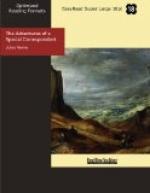“Who is he?”
“A bold bandit chief, half-Chinaman, half-Mongol. Having for some time been a terror to Yunnan, he was being too closely pursued, and has now moved into the northern provinces. His presence has ever been reported in that part of Mongolia served by the Grand Transasiatic.”
“Well, he ought to furnish a few paragraphs.”
“The paragraphs Ki-Tsang will furnish you with may cost you too dearly.”
“Bah! major, the Twentieth Century is quite rich enough to pay for its glory.”
“To pay with its money, perhaps, but we may have to pay with our lives! Luckily our companions have not heard you talk in this way, or they might come in a body and demand your expulsion from the train. So be careful, and keep a guard on your desires as a newspaper man in quest of adventures. Above all, don’t have anything to do with this Ki-Tsang. It would be all the better in the interest of the passengers.”
“But not of the passage, major.”
We returned towards the station. The stoppage at Douchak had another half hour to last. As I walked on the quay, I observed something going on which would change the make-up of our train.
Another van had arrived from Teheran by the branch line to Mesphed, which puts the Persian capital in communication with the Transcaspian.
This van was bolted and barred, and accompanied by a squad of Persian police, whose orders seemed to be not to lose sight of it.
I don’t know what made me think so, but it seemed as though this van had something mysterious about it, and as the major had left me, I went and spoke to Popof, who was watching over the proceedings.
“Popof, where is that van going?”
“To Pekin.”
“And what has it got in it?”
“What has it got in it? An exalted personage.”
“An exalted personage?”
“Are you surprised?”
“I am. In this van?”
“It is his own idea.”
“Well, Popof, when this exalted personage gets out perhaps you will let me know?”
“He Will not get out.”
“Why not?”
“Because he is dead.”
“Dead?”
“Yes, and it is his body they are taking to Pekin, where he will be interred with all the honors due to him.”
So that we were to have an important personage in our train—in the shape of a corpse, it is true. Never mind! I asked Popof to discover the name of the defunct. He ought to be some mandarin of mark. As soon as I knew it I would send a telegram to the Twentieth Century.
While I was looking at this van, a new passenger came up and examined it with no less curiosity than I did.
This traveler was a fine-looking man of about forty, wearing gracefully the costume of the richer Mongols, a tall fellow, with rather a gloomy look, a military moustache, tawny complexion, and eyes that never shut.




